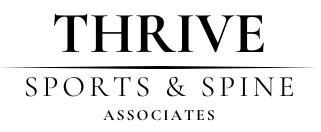How Chronic Neck Pain Affects Balance, Reaction Time & Strength

How Chronic Neck Pain Affects Balance, Reaction Time & Strength
At Thrive Sports and Spine we’re passionate about helping athletes and active individuals move better, feel stronger, and recover faster. One area that often gets overlooked—but plays a major role in athletic performance—is chronic neck pain. A recent study sheds light on how even nonspecific neck discomfort can impact your balance, reaction time, and upper body strength, especially in young women. And as your sports chiropractor we want to break it down in simple terms.
What Did the Study Find?
Researchers looked at athletes between the ages of 18–30 who had ongoing, nonspecific neck pain (meaning it wasn’t caused by trauma or specific injury). They found that:
- Balance was impaired — especially when eyes were closed or during dynamic movements.
- Reaction time was slower, especially during tasks that require fast hand-eye coordination.
- Upper body strength was reduced, particularly in explosive movements like medicine ball throws.
The Worse the Pain, the Worse the Performance
One of the key findings? The more intense the neck pain, the greater the decline in performance. That means your daily discomfort isn't just annoying—it can affect how your entire body functions, from core stability to athletic coordination.
Why Does Neck Pain Affect the Whole Body?
The neck (or cervical spine) is packed with sensory receptors that help your brain process body position, movement, and coordination. When pain lingers in that area, those signals can become distorted. This can lead to:
- Delayed reaction time (think: slower response when driving, catching, or lifting)
- Poor postural control (hello, balance issues!)
- Weakened muscle activation, especially in the shoulders and arms
At Thrive, we see this all the time—especially in athletes who lift, throw, or use screens all day. Their neck discomfort is often paired with stiffness, weakness, and slower recovery after workouts or competition.
How We Help at Thrive Spine & Sports Rehab
As a sports chiropractic clinic in Somers Point and Vineland, NJ, we use a multi-technique approach to help patients overcome neck pain and regain performance. Our care often includes:
- Active Release Technique (ART) to release scar tissue and muscle tightness
- NeuroKinetic Therapy (NKT) to correct muscle imbalances and faulty movement patterns
- Chiropractic adjustments to restore proper joint motion
- Spinal decompression therapy to relieve nerve pressure and improve alignment
If you’re dealing with chronic neck pain—even if it seems minor—it could be affecting more than you think. Balance, reaction time, and upper body strength are essential for athletes, weekend warriors, and anyone living an active lifestyle.
🎾Pickleball/Tennis
🏋️♀️ CrossFit
🏀 Basketball
⚾ Baseball
🥎 Softball
🏈 Football
⚽ Soccer
🏃♂️ Running
🏌️♂️ Golf
🤸Gymnastics
👯Dance
By combining
chiropractic adjustments, soft tissue therapy, and neuromuscular re-education, we offer one of the most
comprehensive sports rehabilitation programs in Atlantic County and Cumberland County.
Book Your Consultation Today
If you’re tired of dealing with pain, struggling with an injury, or looking to optimize your performance, we’re here to help.
Schedule a consultation today and experience the difference of advanced sports chiropractic care.
📍 Serving Somers Point and Vineland, NJ – Your Destination for Cutting-Edge Chiropractic Care!












